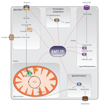Metabolic reprogramming and epithelial-to-mesenchymal transition in cancer
- PMID: 28444969
- PMCID: PMC6049610
- DOI: 10.1111/febs.14090
Metabolic reprogramming and epithelial-to-mesenchymal transition in cancer
Abstract
Several lines of evidence indicate that during transformation epithelial cancer cells can acquire mesenchymal features via a process called epithelial-to-mesenchymal transition (EMT). This process endows cancer cells with increased invasive and migratory capacity, enabling tumour dissemination and metastasis. EMT is associated with a complex metabolic reprogramming, orchestrated by EMT transcription factors, which support the energy requirements of increased motility and growth in harsh environmental conditions. The discovery that mutations in metabolic genes such as FH, SDH and IDH activate EMT provided further evidence that EMT and metabolism are intertwined. In this review, we discuss the role of EMT in cancer and the underpinning metabolic reprogramming. We also put forward the hypothesis that, by altering chromatin structure and function, metabolic pathways engaged by EMT are necessary for its full activation.
Keywords: EMT; FH; IDH; SDH; cancer; epigenetics; metabolism; metastasis; mitochondrial metabolism.
© 2017 Federation of European Biochemical Societies.
Conflict of interest statement
The authors declare no competing interests.
Figures




References
Publication types
MeSH terms
Substances
Grants and funding
LinkOut - more resources
Full Text Sources
Other Literature Sources
Miscellaneous

